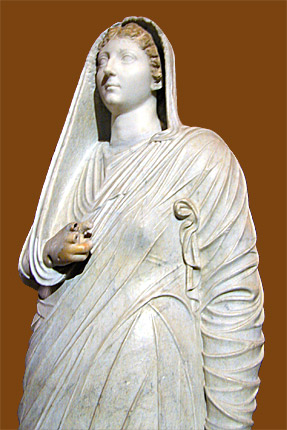
Livia, life-size painted statue, marble
Villa of the Mysteries, Pompeii, 1 century CE
(full size)
Livia Drusilla (59/58 BCE-29 CE) is the subject of fascinating but divergent accounts by the Roman historians Tacitus, Cassius Dio, and Suetonius, who preserved major events of her long life. Her elite social status and aristocratic connections derived from the patrician gens Claudia (characterized in Livy AUC 2.56.7 as familia superbissima ac crudelissima in plebem Romanam) and the Livii Drusi, who adopted her father Marcus Livius Drusus Claudianus (93 BCE-42 BCE), the senator and praetor who fought at Philippi and committed suicide after the defeat of the Republican forces; her mother, Alfidia, of no attested family, possibly came from Fundi. Livia brought a rich political dowry to her marriage in c. 43 BCE to Tiberius Claudius Nero (c. 82-33 BCE), when she was c. 16 and he was c. 39. She bore him two sons, Tiberius Claudius Nero (42 BCE-37 CE) and Nero Claudius Drusus Germanicus (38–9 BCE), her only children. In the fall of 39 BCE Octavian (see Gaius Octavius) divorced his second wife wife Scribonia on the day she bore his only child Julia, and Livia, pregnant with Drusus, divorced her husband Tiberius Claudius Nero, who then gave her in marriage to Octavian early in the the following year (Paterculus, HR II.79.2 and HR II.94). While ancient sources have different opinions about their divorce and remarriage (see Tacitus, Annales V.1-3), modern scholars argue that although there were personal, economic and social factors (see Divortium), the chief motivation on both sides was political expedience (see Huntsman). Roman law required Livia to leave her sons with their father (until his death in 33 BCE), and presumably, since her father was dead, she entered Octavian's home; no record exists of the arrangements that were negotiated for her inheritance and dowry. In this passage Paterculus portrays a young Livia, a loyal and brave wife and protective mother, who is not fully congruent with the mature Livia less favorably portrayed in surviving texts, where she is criticized for her ambitious involvement in her sons’ political careers (see Tacitus, Annales I.3-6) and in state affairs that defied gender expectations, and her rumored engineering of the deaths of Marcellus, of Julia’s sons Lucius and Gaius by Marcus Agrippa (see Augustan succession), and even that of Augustus himself, on behalf of her son Tiberius. The Augustan historian Velleius Paterculus (19 BCE-c.31 CE) is unique in his focus on a major event in Livia’s young life: at 18 years of age, she was drawn into the terrors of the civil war at Perugia and in Campania, when her husband fought on the side of Antony against Octavian. In addition to her beauty and goodness, Paterculus highlights Livia’s courage and loyalty when she, fleeing alone (uno comitante) from Octavian's pursuit, joined her husband Nero and escaped to Sicily and refuge in Greece. In his narration of this episode from her early life he inserts her adoption by Augustus in his will (14 CE) as Julia Augusta and her position as chief priestess of Augustus's imperial cult. For further information on Livia, see McManus, Livia: Princeps Femina and Livia and Coins; Barrett (2004), Dixon (2001), pp. 110-112, Flory (1993), Huntsman (2009), Kampen (2009), Kleiner & Matheson (2000), Salzman-Mitchell (2007), Treggiari (1975) in the Bibliography.
Following his account in Chapter 74 of the defeat of the Antonine forces at Perugia in 40 BCE (see Fulvia), Paterculus opens Chapter 75 with praise for Livia's husband, Tiberius Claudius Nero, who led an insurrection in Campania in defense of veterans who had lost their lands in the wars; it was put down by Octavian's arrival. Paterculus then remarks on the vagaries of fortune (see the goddess Fortuna), citing the startling reversals in the life of the young matrona Livia.2 Quis fortunae mutationes, quis dubios rerum humanarum casus satis mirari queat? Quis non diversa praesentibus contrariaque expectatis aut speret aut timeat?
3 Livia, nobilissimi et fortissimi viri Drusi Claudiani filia, genere, probitate, forma Romanarum eminentissima, quam postea coniugem Augusti vidimus, quam transgressi ad deos sacerdotem ac filiam, tum fugiens mox futuri sui Caesaris arma ac manus ![]() bimum hunc Tiberium Caesarem, vindicem Romani imperii futurumque eiusdem Caesaris filium, gestans sinu, per avia itinerum vitatis militum gladiis uno comitante,
bimum hunc Tiberium Caesarem, vindicem Romani imperii futurumque eiusdem Caesaris filium, gestans sinu, per avia itinerum vitatis militum gladiis uno comitante, ![]() quo facilius occultaretur fuga, pervenit ad mare et cum viro Nerone pervecta in Siciliam est.
quo facilius occultaretur fuga, pervenit ad mare et cum viro Nerone pervecta in Siciliam est.
Click on the underlined words for translation aids and commentary, which will appear in a small window. Click on the icon link![]() to the right of the line for related images and information.
to the right of the line for related images and information.